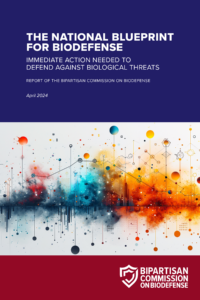Bipartisan Commission On Biodefense Urges Immediate Action to Address Major Vulnerabilities

FOR IMMEDIATE RELEASE
Contact: Steve Aaron
SRA Communications
(717) 554-8614
steve@SRACommunications.com

NATION DANGEROUSLY UNPREPARED FOR DEADLY OUTBREAKS AND
BIOLOGICAL ATTACKS:
BIPARTISAN COMMISSION ON BIODEFENSE URGES IMMEDIATE ACTION
TO ADDRESS MAJOR VULNERABILITIES
Commission Dedicates 2024 National Blueprint for Biodefense to founding
Co-Chair Joe Lieberman for his tireless efforts to make America and the world safer
WASHINGTON, D.C. (May 7, 2024) – The Bipartisan Commission on Biodefense will gather today at the National Press Club to urge our Nation’s leaders to change the government’s biodefense cadence from on-again/off-again to always on, or risk biological calamities that could destroy society.
The Commission released its much-anticipated 2024 National Blueprint for Biodefense to assist the Administration, Congress, Governors, and other government leaders in this work. Addressing the full range of biological threats – naturally occurring deadly diseases, accidental releases from laboratories, and biological attacks designed to kill and wreak havoc – the Blueprint contains 36 recommendations and 185 action items. This is the Commission’s 14th report since its inception 10 years ago, reexamining, modifying, and adding to its original recommendations. The Commission also released an appendix entitled, Proposed Congressional Hearings on the Recommendations of the 2024 National Blueprint for Biodefense.
“We know that apathy, inability to focus, and poor prioritization resulted in more than one million deaths and six million hospitalizations due to COVID-19. Despite some lessons learned and progress made, America remains dangerously vulnerable to the next biological event,” said Commission Co-Chair Tom Ridge, former Governor of Pennsylvania and first Secretary of Homeland Security under President George W. Bush. “Instead of complaining, our Commission works in a bipartisan fashion and offers solutions that address the full range of biological threats and activities necessary to defend against them. The reality is that our government must meet and overcome multiple threats to America immediately. Every outbreak, release, and attack shows us we are out of time.”
As detailed in the Blueprint, success will depend on exercising authority, political will, awareness, and foresight regarding the breadth and severity of biological threats. The Commission still believes today, as it did when it released its first National Blueprint for Biodefense in 2015, that America needs top-level national leadership of the biodefense enterprise to address this problem head-on.
“This problem is not insurmountable,” said Commission Co-Chair Donna Shalala, former Congresswoman and Secretary of Health and Human Services under President William J. Clinton. “If we demand and take action on the recommendations contained within this National Blueprint for Biodefense, we can save lives now. A clear and present danger like this requires clear and present governance.”
Co-Chairs Ridge and Shalala opened their remarks today noting that this National Blueprint is dedicated to the memory and profound legacy of former Senator Joe Lieberman, founding co-chair of the Commission who passed away unexpectedly on March 27. “Joe’s tireless efforts made America and the world safer,” said Governor Ridge. “We all miss him dearly and are committed to carrying forward with this work that was so important to him. He was a driving force behind this new National Blueprint.”
For ten years, the Bipartisan Commission on Biodefense has examined U.S. national defense against biological attacks, emerging and reemerging infectious diseases, and accidental releases of biological agents. Through research and hundreds of interviews, testimonies, and conversations with leading experts, the Commission still finds that diseases continue to exploit gaps in national biodefense, and hasty attempts to shore up one vulnerability expose many others.
Highlighted recommendations from the 2024 Blueprint include:
Strong national biodefense requires sustained leadership from the White House. The Commission recommends reinforcing White House leadership by codifying the role of the National Security Advisor as the leader of national biodefense. 15 federal departments, 9 independent agencies, and 1 independent institution currently have biodefense responsibilities, and one federal department cannot tell other departments and agencies what to do. Only the White House can, and they need to exercise that authority.
A comprehensive National Biodefense Strategy is critical to success. The Commission calls for a quadrennial biodefense review that would culminate in an updated National Biodefense Strategy and Implementation Plan submitted to Congress by the White House. Biological threats change. Biotechnology changes. Our biodefense must change, accordingly.
Reducing the spread of disease indoors saves lives. The Commission calls for a research and development plan with the goal of reducing pathogen transmission in buildings. Diseases like COVID-19 linger in the air. Closing windows and shutters will not defend our buildings against biological threats. Cleaning the air from the inside out will.
Investments today ensure we are prepared tomorrow. U.S. investment in medical countermeasure development is dangerously insufficient and requires emergency funding from Congress each time America faces a biological event affecting national security. This panic-and-neglect cycle results in needless loss of life. The government must fund the medical countermeasures enterprise at no less than authorized levels and address needs identified by the National Strategy for Biodefense.
Using biological detection systems that actually work will protect cities. Twenty years after its implementation, the potential of BioWatch (equipment placed in major cities across the Nation to detect deadly airborne pathogens) remains unrealized. Congress need not wait another two decades to require the replacement of ineffectual BioWatch technology. We can transfer and build on biodetection technologies already in development today.
“Alone, each of our recommendations facilitates some degree of positive change,” Senator Lieberman said prior to today’s release of the National Blueprint. “However, together, they provide a blueprint for biodefense capable of addressing 21st Century biological threats and meeting public expectations of the government to deal with them.”
About the Bipartisan Commission on Biodefense
The Bipartisan Commission on Biodefense was established in 2014 to conduct a comprehensive assessment of the state of U.S. biodefense efforts, and to issue recommendations to foster change. The Commission’s 2015 report, A National Blueprint for Biodefense: Leadership and Major Reform Needed to Optimize Efforts, identified capability gaps and recommended changes to U.S. policy and law to strengthen national biodefense while optimizing resource investments. Subsequent Commission publications have addressed critical needs for an Apollo Program for Biodefense, biological risk reduction, biodetection, agrodefense, the role of the land-grant universities, budget reform, diagnostics, critical infrastructure, reducing the risk of orthopoxviruses, and State, Local, Tribal and Territorial response capabilities. In September 2018 and in October 2022, the White House released the National Biodefense Strategy, and in January 2023, OMB released a biodefense budget crosscut, top recommendations from the Blueprint. In September 2021 the White House released the American Pandemic Preparedness Plan, taking up recommendations from the Commission’s Apollo Program and Athena Agenda reports. The Commission continues to address biodefense challenges and to urge reform. Former Governor Tom Ridge and Secretary Donna Shalala co-chair the Commission. Hudson Institute is the Commission’s fiscal sponsor.

